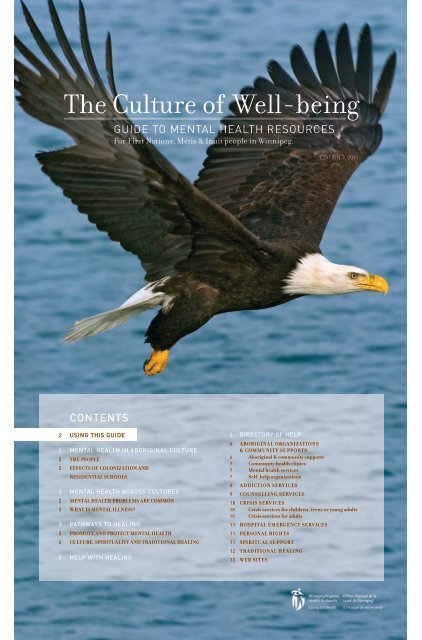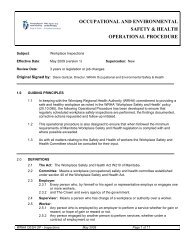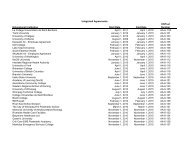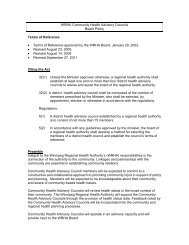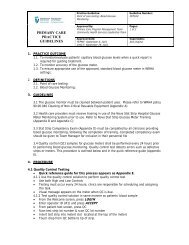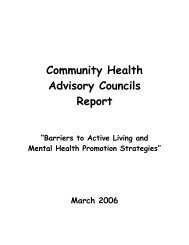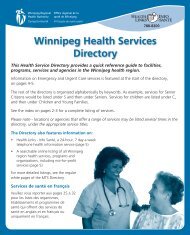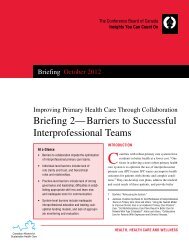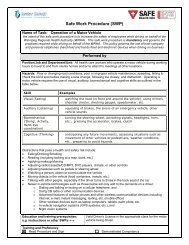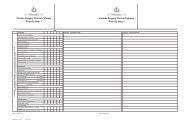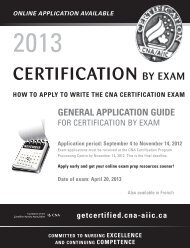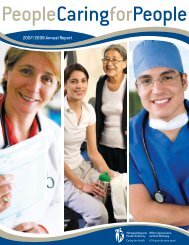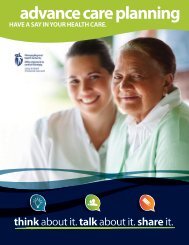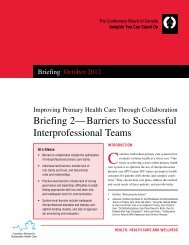The Culture of Well-being - Winnipeg Regional Health Authority
The Culture of Well-being - Winnipeg Regional Health Authority
The Culture of Well-being - Winnipeg Regional Health Authority
Create successful ePaper yourself
Turn your PDF publications into a flip-book with our unique Google optimized e-Paper software.
<strong>The</strong> <strong>Culture</strong> <strong>of</strong> <strong>Well</strong>-<strong>being</strong><br />
GUIDE TO MENTAL HEALTH RESOURCES<br />
For First Nations, Métis & Inuit people in <strong>Winnipeg</strong>.<br />
EDITION 3, 2011<br />
CONTENTS<br />
2 USING THIS GUIDE<br />
2 MENTAL HEALTH IN ABORIGINAL CULTURE<br />
2 THE PEOPLE<br />
2 EFFECTS OF COLONIZATION AND<br />
RESIDENTIAL SCHOOLS<br />
2 MENTAL HEALTH ACROSS CULTURES<br />
2 MENTAL HEALTH PROBLEMS ARE COMMON<br />
3 WHAT IS MENTAL ILLNESS?<br />
3 PATHWAYS TO HEALING<br />
3 PROMOTE AND PROTECT MENTAL HEALTH<br />
4 CULTURE, SPIRITUALITY AND TRADITIONAL HEALING<br />
5 HELP WITH HEALING<br />
6 DIRECTORY OF HELP<br />
6 ABORIGINAL ORGANIZATIONS<br />
& COMMUNITY SUPPORTS<br />
6 Aboriginal & community supports<br />
7 Community health clinics<br />
7 Mental health services<br />
7 Self-help organizations<br />
8 ADDICTION SERVICES<br />
9 COUNSELLING SERVICES<br />
10 CRISIS SERVICES<br />
10 Crisis services for children, teens or young adults<br />
10 Crisis services for adults<br />
11 HOSPITAL EMERGENCY SERVICES<br />
11 PERSONAL RIGHTS<br />
11 SPIRITUAL SUPPORT<br />
12 TRADITIONAL HEALING<br />
12 WEB SITES
GUIDE TO MENTAL HEALTH RESOURCES<br />
For First Nations, Métis & Inuit people in <strong>Winnipeg</strong>.<br />
Aboriginal peoples <strong>of</strong><br />
Canada are defined<br />
according to the Canadian<br />
Constitution Act (1982) as<br />
“Indian (First Nations),<br />
Inuit and Métis people <strong>of</strong><br />
Canada.” <strong>The</strong> following are<br />
definitions specific to each<br />
Aboriginal group:<br />
First Nations<br />
Descendants <strong>of</strong> the<br />
original inhabitants <strong>of</strong><br />
North America. Although<br />
the term “First Nation”<br />
is now widely used, there<br />
is no legal definition for<br />
it. (Indian and Northern<br />
Affairs Canada, 2005).<br />
Métis<br />
Métis means a person who<br />
self-identifies as Métis, is<br />
<strong>of</strong> historic Métis National<br />
Ancestry, is distinct from<br />
other Aboriginal Peoples<br />
and is accepted by the<br />
Métis Nation (Métis<br />
National Council, 2002)<br />
Inuit<br />
<strong>The</strong> Aboriginal people <strong>of</strong><br />
Arctic Canada who live<br />
primarily in Nunavut the<br />
Northwest Territories,<br />
Labrador, and Northern<br />
Quebec. Inuit means, “<br />
the people” in Inuktitut,<br />
the Inuit Language.<br />
(Indian and Northern<br />
Affairs Canada, 2005).<br />
USING THIS GUIDE<br />
<strong>The</strong> <strong>Winnipeg</strong> <strong>Regional</strong> <strong>Health</strong> <strong>Authority</strong> Aboriginal <strong>Health</strong> Programs in collaboration with the <strong>Regional</strong><br />
Mental <strong>Health</strong> Program has put together this guide to assist First Nations, Métis, and Inuit peoples find<br />
mental health care information and services within <strong>Winnipeg</strong>. If someone is experiencing mental health<br />
problems or emotional health concerns, this guide will provide information on types <strong>of</strong> services available<br />
in <strong>Winnipeg</strong> and how to access the various services.<br />
MENTAL HEALTH IN<br />
ABORIGINAL CULTURE<br />
THE PEOPLE<br />
<strong>The</strong> Aboriginal community is an important part <strong>of</strong> Manitoba’s<br />
heritage and future. Over 15% <strong>of</strong> Manitoba’s total population and<br />
10% <strong>of</strong> <strong>Winnipeg</strong>’s total population consider themselves First<br />
Nation, Métis or Inuit peoples (Statistics Canada, 2008). <strong>Winnipeg</strong><br />
currently has the largest urban Aboriginal population <strong>of</strong> the major<br />
cities in Canada.<br />
Although there is great diversity among the 64 First Nation<br />
communities within Manitoba in their usage <strong>of</strong> language<br />
(five First Nation languages are spoken: Ojibway, Cree, Oji-Cree,<br />
Dene and Dakota), ceremonies, religious beliefs, and community<br />
traditions, holistic wellness remains a priority among most groups<br />
in maintaining their cultural strength into the future.<br />
EFFECTS OF COLONIZATION AND<br />
RESIDENTIAL SCHOOLS<br />
Many issues facing the Aboriginal community today stem from<br />
the long history <strong>of</strong> colonization. First Nation families were deeply<br />
hurt by the government policy <strong>of</strong> sending their children away to<br />
residential school, which began in 1874 and continued until the last<br />
school was closed in 1996.<br />
<strong>The</strong> purpose <strong>of</strong> residential schooling was to assimilate Aboriginal<br />
community children into mainstream Canadian society by<br />
disconnecting them from family and communities; cutting all ties<br />
with languages, customs, and beliefs. <strong>The</strong> separation <strong>of</strong> children<br />
from their families and traditional culture had a devastating and<br />
long-lasting effect on the Aboriginal community. Many young<br />
adults that came back after <strong>being</strong> in residential schools had been<br />
traumatized by the separation and some by physical, mental and<br />
sexual abuse they had been exposed to in the schools.<br />
Generations <strong>of</strong> people did not learn their family and community<br />
values including their culture, languages, parenting practices,<br />
and ways <strong>of</strong> living on the land. Many people felt stuck between<br />
two worlds, not belonging to either, which resulted in identity<br />
confusion, high rates <strong>of</strong> suicide, depression and substance abuse.<br />
Other health concerns, such as poor housing and less access to<br />
nutrition have also affected the health <strong>of</strong> the<br />
Aboriginal community.<br />
Many children were victims <strong>of</strong> abuse in the residential school<br />
system. As a result, the Government <strong>of</strong> Canada has developed<br />
the Indian Residential Schools (IRS) Resolution <strong>Health</strong> Support<br />
Program to begin work towards healing for those involved. Other<br />
efforts are <strong>being</strong> made to improve the health and well-<strong>being</strong> <strong>of</strong><br />
the Aboriginal community. First Nations, Métis and Inuit peoples<br />
are coming together to share concerns, gather resources, find<br />
ways to improve health and well-<strong>being</strong>, and return to wholeness.<br />
<strong>The</strong> journey <strong>of</strong> healing from the past will come from within the<br />
Aboriginal culture, reconnection as a community and from<br />
sacred traditions.<br />
INDIAN RESIDENTIAL SCHOOLS RESOLUTION<br />
HEALTH SUPPORT PROGRAM<br />
<strong>The</strong> Indian Residential Schools Resolution <strong>Health</strong> Support<br />
Program provides emotional health and wellness support to<br />
former Indian Residential School students and their families,<br />
regardless <strong>of</strong> status and place <strong>of</strong> residence, who are eligible for<br />
the Common Experience Payment and /or resolving an IRS claim<br />
through the Alternative Dispute Resolution process, Independent<br />
Assessment process or litigation.<br />
Eligible former students and their families may have access to:<br />
Pr<strong>of</strong>essional Counselling<br />
Emotional Support provided by Resolution <strong>Health</strong><br />
Support Workers<br />
Cultural Support provided by Elders<br />
Assistance with the cost <strong>of</strong> transportation<br />
For more information on how to access these services contact:<br />
Manitoba <strong>Regional</strong> Office at 1-866-818-3505 located at<br />
3rd Floor, 391 York Avenue, <strong>Winnipeg</strong> or visit:<br />
www.healthcanada.gc.ca/irs or www.irsr-rqpi.gc.ca<br />
Approval from <strong>Health</strong> Canada must be obtained before treatment<br />
begins. A crisis line is available to provide immediate emotional<br />
assistance and can be reached 24 hours a day, seven days a week:<br />
1-866-925-4419<br />
MENTAL HEALTH ACROSS CULTURES<br />
Being mentally healthy means feeling a sense <strong>of</strong> control over one’s<br />
life, feeling able to make decisions, coping with life’s challenges<br />
and participating in life in meaningful ways because there is<br />
balance in the social, physical, spiritual, economic and mental<br />
aspects <strong>of</strong> life. When people <strong>of</strong> any cultural background are feeling<br />
mentally healthy, they can feel good about themselves most <strong>of</strong> the<br />
time. Traditionally, Aboriginal cultural view <strong>of</strong> mental health and<br />
well <strong>being</strong> is a balance <strong>of</strong> the body, mind, emotions and spirit which<br />
is maintained through good relationships within oneself, with<br />
others, within the community and Creation.<br />
MENTAL HEALTH PROBLEMS ARE COMMON<br />
Mental health problems are common among people <strong>of</strong> all ages,<br />
cultures and backgrounds. <strong>The</strong>re are a number <strong>of</strong> reasons why<br />
mental health may not be at its best. Living with problems such as<br />
poverty, discrimination, unemployment, violence or substance<br />
abuse can have a very negative effect on mental health. Life events<br />
such as the death <strong>of</strong> a loved one, <strong>being</strong> in an accident, losing<br />
housing or a job can also be a challenge and sometimes cause<br />
mental health problems.<br />
What is mental illness?<br />
All people have times <strong>of</strong> feeling down or sad, have trouble<br />
concentrating, talk out loud to themselves, or have a thought in<br />
mind and can’t get rid <strong>of</strong> it. <strong>The</strong>se things are normal.<br />
When a person is mentally ill, these kinds <strong>of</strong> feelings, thoughts and<br />
behaviors are extreme and get in the way <strong>of</strong> the person’s ability to go<br />
about their day.<br />
Many cultures do not use the words mental illness to describe when<br />
a person has emotional problems. Instead they may describe how a<br />
person has changed in mood, thoughts or behaviors, or changed in<br />
how he or she relates to others.<br />
Examples <strong>of</strong> some possible changes<br />
or problems in behavior:<br />
• Sleeping too much, or not able to sleep at all<br />
• Not keeping clean and cared for<br />
• Avoiding social contact and previously enjoyed activities<br />
• Laughing or crying inappropriately<br />
• Talking in ways that don’t make sense<br />
• Strange movements or behaviors (such as: talking<br />
out loud to no one; rigid or unusual body positions)<br />
• Unable to control behavior (such as: can’t stop<br />
walking back and forth; sudden violence; washing<br />
hands over and over)<br />
Examples <strong>of</strong> some possible changes<br />
or problems in feelings or mood:<br />
• Extreme feelings <strong>of</strong> “feeling great” and excitement<br />
• Angry, scared or suspicious for no logical reason<br />
• Extreme sadness or hopelessness, sometimes<br />
leading to thoughts or talk <strong>of</strong> suicide<br />
• Sudden emotional changes and mood swings<br />
• Unable to feel or express happiness<br />
or interest in anything<br />
Examples <strong>of</strong> some severe changes<br />
or problems in thoughts and perceptions:<br />
• Hearing, seeing, smelling things that aren’t there<br />
• Unrealistic or mistaken beliefs (such as: people<br />
are trying to kill you; a movie star is in love with you;<br />
you are God or a famous person)<br />
• Having certain thoughts constantly and not <strong>being</strong><br />
able to stop or change the thoughts<br />
• Serious inability to concentrate or unable to connect<br />
thoughts together in a sensible way<br />
• Constant and extreme worry or anxiety<br />
If someone is experiencing these changes or problems, it is<br />
recommended that he or she have a physical assessment to rule<br />
out any underlying physical conditions that may have an effect on<br />
their mental well-<strong>being</strong>. A doctor or nurse with special training<br />
can determine what the problems are, by talking to the person<br />
and those close to them about any changes in thoughts, mood or<br />
behavior and any changes the person has experienced recently such<br />
as a job loss or the death <strong>of</strong> a loved one. It may take some time to<br />
make a diagnosis, but based on the information gathered<br />
a recommended treatment plan may include medication,<br />
counselling or therapy or self-care. Some people may choose to<br />
seek out other paths to healing such as through guidance from an<br />
Elder or spiritual caregiver. It is important to share traditional<br />
healing needs with health care providers.<br />
LEARN MORE<br />
<strong>The</strong> Mental <strong>Health</strong> Education Resource Centre <strong>of</strong> Manitoba is<br />
a public lending library <strong>of</strong> resources including books, print<br />
materials and videotapes on a wide range <strong>of</strong> topics on mental<br />
health and illness including depression, anxiety, eating disorders,<br />
substance use disorders and suicide prevention.<br />
Phone: 204-953-2355<br />
Toll free: 1-866-997-9918<br />
www.mherc.mb.ca<br />
For more information on mental health resources see the Mental<br />
<strong>Health</strong> Resource Guide for <strong>Winnipeg</strong> published by the Canadian<br />
Mental <strong>Health</strong> Association.<br />
Phone: 204-982-6100 or go to their website to down load a<br />
copy at www.cmhawpg.mb.ca<br />
PATHWAYS TO HEALING<br />
<strong>The</strong>re may be many different reasons why a person experiences<br />
disharmony or imbalance. Pain, hurt, rejection, disappointment<br />
and loneliness may cause a person to experience mental health<br />
problems. For some people, working through these painful feelings<br />
and experiences is viewed as part <strong>of</strong> a necessary spiritual journey.<br />
<strong>The</strong>re are many ways <strong>of</strong> healing disharmony or imbalance within<br />
the Aboriginal culture. Some people use ceremonies, guidance from<br />
Elders, wholesome nutrition, meaningful activity, and connection<br />
with family and the land as part <strong>of</strong> their pathways to healing process.<br />
Promote and protect mental health<br />
Being mentally healthy involves accepting who we are and<br />
realizing that we have strengths as well as limitations. Dealing<br />
with problems effectively when they arise, taking responsibility<br />
for actions and setting realistic goals also helps to build personal<br />
and community resilience. Resilience is the ability to bounce<br />
back from life’s challenges in a positive way. It means that when<br />
faced with challenges, hope can be maintained, positive coping<br />
strategies can be used, and even confidence is gained to deal with<br />
future challenges.<br />
By doing everyday things to care for body, mind and spirit, personal<br />
mental health and resilience can be promoted. Eating well, getting<br />
regular exercise and getting adequate rest and sleep will not only<br />
keep the body healthy but the mind healthy as well. <strong>The</strong>re are many<br />
simple and inexpensive ways to stay physically active. Walking is<br />
one <strong>of</strong> the best ways to keep active every day. Keeping well also<br />
involves maintaining good relationships with family or friends<br />
and feeling connected with the community. Some simple ways <strong>of</strong><br />
Worldview <strong>of</strong><br />
mental health:<br />
Mental wellness is a lifelong<br />
journey to achieve wellness<br />
and balance <strong>of</strong> body, mind<br />
and spirit. Mental wellness<br />
includes self-esteem,<br />
personal dignity, cultural<br />
identity and connectedness in<br />
the presence <strong>of</strong> harmonious<br />
physical, emotional, mental<br />
and spiritual wellness. Mental<br />
wellness must be defined<br />
in terms <strong>of</strong> the values and<br />
beliefs <strong>of</strong> Aboriginal people.<br />
(First Nations and Inuit<br />
<strong>Health</strong>, Mental <strong>Well</strong>ness<br />
Framework, 2002).<br />
2 3
GUIDE TO MENTAL HEALTH RESOURCES<br />
For First Nations, Métis & Inuit people in <strong>Winnipeg</strong>.<br />
staying connected could include things like volunteering at the<br />
local library, school or community centre, joining in activities or<br />
classes, or for others it might mean getting involved with a spiritual<br />
community. <strong>The</strong>se kinds <strong>of</strong> activities give us a sense <strong>of</strong> purpose and<br />
meaning to life and can provide support when things aren’t going<br />
so well.<br />
ABORIGINAL HEALTH PROGRAMS<br />
Aboriginal <strong>Health</strong> Programs – <strong>Health</strong> Services assist health-care<br />
staff to provide quality care for Aboriginal clients by <strong>of</strong>fering the<br />
following services. <strong>The</strong>se services are available to patients in<br />
hospitals and their families.<br />
Aboriginal Worldview<br />
Aboriginal Worldview is a way <strong>of</strong> looking at the world in a<br />
holistic way that respects the inter connectedness <strong>of</strong> all things<br />
and forms <strong>of</strong> life. <strong>The</strong> Aboriginal Worldview honours this<br />
connection by respect and value <strong>of</strong> all these relationships.<br />
<strong>The</strong> circle symbolizes these connections by representing<br />
wholeness; the contributions <strong>of</strong> all <strong>of</strong> the many aspects <strong>of</strong> self,<br />
family and community, and the Mother Earth.<br />
Aboriginal Patient Advocate:<br />
Assists Aboriginal clients and their families to resolve client<br />
concerns and ensure a holistic healing approach.<br />
Interpreters:<br />
Translator services are available in Ojibway, Cree and<br />
Oji-Cree language dialects.<br />
<strong>Regional</strong> Discharge Coordinator:<br />
Works with the health care team to ensure a coordinated<br />
approach to discharge planning.<br />
Spiritual and Cultural Program:<br />
Coordinates support to clients and families to meet there<br />
spiritual needs within the hospital setting.<br />
All Aboriginal <strong>Health</strong> Programs – <strong>Health</strong> Services are free <strong>of</strong> charge<br />
and provided upon request. All information will remain private<br />
and confidential.<br />
To access Aboriginal <strong>Health</strong> Services please contact<br />
Central Intake at 1-877-940-8880.<br />
CULTURE, SPIRITUALITY<br />
& TRADITIONAL HEALING<br />
Traditional healing may be used to address both physical and<br />
mental health issues. Many traditional healing practices are used<br />
today by Elders and Traditional Healers/helpers and include the<br />
use <strong>of</strong> natural herbs, sacred ceremonies, song and dance, the vision<br />
quest, prayer, the sweat lodge, and the healing circle. Healing<br />
practices may include traditional teachings to assist people in<br />
gaining wisdom from their experiences and regaining their sense<br />
<strong>of</strong> balance and belonging. Healing ceremonies are individualized<br />
for each person after the healer assesses the person’s needs and<br />
decides what traditional approach to use. A ceremony may be<br />
conducted, instructions given to the person, and the person may<br />
be assisted in their healing journey. For some, their beliefs and<br />
practices form an integral part <strong>of</strong> their <strong>being</strong> and is a way <strong>of</strong> life.<br />
Traditional Practices<br />
Some traditional practices include:<br />
SMUDGING - a sacred ritual done to spiritually cleanse and be<br />
open and ready for positive healing energy. <strong>The</strong> smudge consists <strong>of</strong><br />
one <strong>of</strong> the four sacred plants: tobacco, sweet grass, cedar and sage<br />
or a mixture <strong>of</strong> the plants.<br />
SHARING/TALKING CIRCLES - a ceremony used by some people<br />
to discuss issues or share feelings in a safe climate <strong>of</strong> trust and<br />
cooperation. Equality and respect are encouraged and reinforced<br />
through the sharing circle.<br />
SACRED ITEMS - many items may be used by traditional<br />
Aboriginal communities for ceremonies and healing gatherings.<br />
TOBACCO OFFERING - tobacco holds a special significance and<br />
serves as a means <strong>of</strong> opening communication with the spirit world.<br />
It symbolizes honesty and respect.<br />
SACRED TEACHINGS - sacred teachings or values are taught<br />
to promote healthy living. <strong>The</strong>re are a variety <strong>of</strong> teachings.<br />
Some include: wisdom, love, respect, bravery/courage, honesty,<br />
humility and truth. <strong>The</strong>y are intended to help the community and<br />
environment live in harmony.<br />
SPIRIT NAMES - names generally given in the language <strong>of</strong> the<br />
individual <strong>being</strong> named. <strong>The</strong> name describes an individual’s<br />
character and <strong>of</strong>ten comes with some responsibility <strong>of</strong> serving<br />
the community. <strong>The</strong>se names are special and much preparation is<br />
required prior to receiving them. Only some Elders have the gift <strong>of</strong><br />
name giving.<br />
SWEAT LODGE CEREMONY - this ceremony may vary in how it<br />
is conducted as well as in the teaching that explains its origin. It is<br />
generally conducted in sacred lodges, dome shaped structures <strong>of</strong>ten<br />
built from bent willow, for the purpose <strong>of</strong> prayer, cleansing and<br />
purifying body, mind and spirit.<br />
Traditional Healers<br />
Some traditional healers are:<br />
SPIRITUALIST – focuses on the spiritual well-<strong>being</strong> <strong>of</strong> a person<br />
and acts on his or her behalf to recommend lifestyle changes to<br />
the individual or family and <strong>of</strong>ferings to various kind spirits.<br />
This person <strong>of</strong>ten serves as a counsellor, mentor or teacher to<br />
individuals and families.<br />
HERBALISTS – uses knowledge <strong>of</strong> traditional medicinal plants.<br />
Practice can be highly specialized in one area, such as remedies for<br />
specific ailments, or diverse for other types <strong>of</strong> illness.<br />
DIAGNOSIS SPECIALIST OR SEER – communicates with<br />
spirits, the supernatural and the physical entities that assist in<br />
the diagnosis. Diagnostics are <strong>of</strong>ten the seers or communicators<br />
through ceremony who identify ailments, remedies or ceremonies<br />
required to restore good spiritual, emotional and physical health<br />
and well-<strong>being</strong>.<br />
MEDICINE PEOPLE – engage in ritual, ceremonial activity and<br />
prayer. Medicine people may possess sacred items and the rights<br />
to rituals, songs and medicines that have been inherited from<br />
parents, grandparents, or that they earned through apprenticeship<br />
with a respected medicine man or woman. Depending on their<br />
nation, they are also conductors <strong>of</strong> community ceremonies. <strong>The</strong>se<br />
individuals <strong>of</strong>ten sacrifice their daily lives to ritual, prayer<br />
and healing.<br />
HEALER – heals in a variety <strong>of</strong> ways, such as a gift <strong>of</strong> touch or<br />
energy work. A healer can be ritualistic, but also may have an ability<br />
to use a variety <strong>of</strong> therapies to heal people spirituality, emotionally<br />
or physically.<br />
MIDWIFE – has specialized traditional knowledge in prenatal care,<br />
childbirth and aftercare. <strong>The</strong> midwife may employ<br />
the use <strong>of</strong> massage, diets, medicines and ritual, prayers<br />
and counselling.<br />
ELDER – is considered exceptionally wise in the ways <strong>of</strong> culture<br />
and the teachings <strong>of</strong> the Great Spirit. <strong>The</strong> Elder is recognized<br />
for wisdom, stability, humour and the ability to know what is<br />
appropriate in a particular situation. <strong>The</strong> community looks to<br />
Elders for guidance and sound judgment because Elders are caring<br />
and are known to share the fruits <strong>of</strong> their labours and experiences<br />
with others in the community. (Aboriginal Healing Foundation)<br />
HELP WITH HEALING<br />
It is important to get help early to move forward on a healing path.<br />
It is a good idea to visit a doctor to check overall health and rule<br />
out any other physical illness. Doctors need the details about<br />
mental and emotional changes <strong>being</strong> experienced so they can<br />
provide the best advice and treatment. Traditional healing needs<br />
should also be shared with health care providers. If possible, it<br />
is best to keep one family doctor so he or she gets to know one’s<br />
complete health history.<br />
To find a family doctor who is accepting new patients call<br />
Family Doctor Connections at 786-7111 or contact the College<br />
<strong>of</strong> Physicians and Surgeons <strong>of</strong> Manitoba at 774-4344<br />
(www.cpsm.mb.ca).<br />
Specialists such as a psychiatrist, psychologist or other mental<br />
health pr<strong>of</strong>essional may be referred to for treatment <strong>of</strong> mental<br />
health concerns. Mental health pr<strong>of</strong>essionals are trained to assess,<br />
diagnose and treat a full range <strong>of</strong> emotional and psychological<br />
problems. Other pr<strong>of</strong>essionals who may be helpful include:<br />
psychiatric nurses, social workers, community mental health<br />
workers or occupational therapists. Some mental health care<br />
providers specialize in specific problems or age groups.<br />
Comfort levels for sharing mental and emotional concerns differ<br />
for everyone. <strong>Health</strong> care providers understand this and will talk<br />
about things at a pace that is comfortable for each person. It is<br />
always okay to ask a health care provider questions.<br />
<strong>Health</strong> Links – Info Sante<br />
788-8200 or toll-free<br />
1-888-315-9257.<br />
<strong>Health</strong> Links-Info Sante<br />
is a 24 hour 7 days a week<br />
telephone health information<br />
service staffed by registered<br />
nurses with the knowledge<br />
to provide answers over<br />
the phone to health care<br />
questions and guide callers<br />
to services.<br />
4 5
GUIDE TO MENTAL HEALTH RESOURCES<br />
For First Nations, Métis & Inuit people in <strong>Winnipeg</strong>.<br />
DIRECTORY OF HELP<br />
ABORIGINAL<br />
ORGANIZATIONS<br />
& COMMUNITY<br />
SUPPORTS<br />
Many community agencies<br />
and Aboriginal organizations<br />
in <strong>Winnipeg</strong> <strong>of</strong>fer services and<br />
supports to adults, children and<br />
families. Generally, there are<br />
no costs for these services but<br />
there may be a wait for some<br />
services. This section has been<br />
divided into four main areas for<br />
easier reference:<br />
Aboriginal & Community Supports<br />
Community <strong>Health</strong> Clinics<br />
Mental <strong>Health</strong> Services<br />
Self Help Organizations<br />
Aboriginal &<br />
Community Supports<br />
Abinotci Min-Ayawin<br />
Room 215 – 181 Higgins Avenue,<br />
<strong>Winnipeg</strong>, MB R3B 1H2<br />
Phone: 925-3700<br />
Fax: 925-3709<br />
www.abcentre.org/health.html<br />
Offers family and individuals<br />
support that encourages healthy<br />
living. Sharing circles, access<br />
to Elders, parenting programs,<br />
traditional healing, advocacy,<br />
child wellness assessment, and<br />
referrals to other community<br />
services are available.<br />
Aboriginal <strong>Health</strong><br />
and <strong>Well</strong>ness Centre<br />
<strong>of</strong> <strong>Winnipeg</strong>, Inc.<br />
(AHWC)<br />
215 - 181 Higgins Avenue,<br />
<strong>Winnipeg</strong>, MB R3B 1H2<br />
Phone: 925-3700<br />
www.abcentre.org/health.html<br />
A community and culturally<br />
based Centre <strong>of</strong>fering<br />
services and resources using<br />
traditional and Western models<br />
(traditional healers and elders<br />
are available).<br />
Programs include:<br />
• Abinotci Mino-Ayawin<br />
(Children’s Healing)<br />
• Head Start Program<br />
• <strong>Well</strong>ness Centre<br />
• <strong>Well</strong>ness Centre Traditional<br />
Services & Programs<br />
• Women’s Healing Program<br />
• Men’s Healing Program<br />
• Stop FAS<br />
• Indian Residential<br />
School Program<br />
Andrews Street<br />
Family Centre<br />
220 Andrews Street, <strong>Winnipeg</strong><br />
Phone: 589-1721<br />
Drop-in centre; serves youth<br />
ages 6 to 17 years.<br />
EAGLE Urban<br />
Transition Centre<br />
501 - 286 Smith Street,<br />
<strong>Winnipeg</strong>, MB, R3B 1H2<br />
Phone: 954-3050<br />
A First Nation agency that<br />
assists and advocates for<br />
First Nation people who<br />
have relocated to <strong>Winnipeg</strong>.<br />
Eyaa-keen Centre Inc.<br />
547 Notre Dame Avenue,<br />
<strong>Winnipeg</strong><br />
Phone: 783-2976<br />
Fax: 284-7292<br />
Toll Free: 1-877-423-4648<br />
www.eyaa-keen.org<br />
Eyaa-keen Centre services focus<br />
on providing an integrated<br />
physical, emotional, mental and<br />
spiritual treatment, healing and<br />
development at the person’s<br />
pace. Provides Aboriginal<br />
traditional, intensive, multidisciplinary<br />
treatment for adult<br />
Aboriginal individuals, couples<br />
and groups, by <strong>of</strong>fering treatment<br />
for trauma and major loss, group<br />
work, therapeutic training and<br />
individual support, all with a<br />
view to personal and community<br />
healing, change and development.<br />
Ikwe-Widdjiitiwin<br />
P.O. Box 1056, <strong>Winnipeg</strong><br />
Phone: 987-2780<br />
Fax: 987-2826<br />
Toll Free: 1-800-362-3344<br />
Ikwe-Widdjiitiwin Inc. is a<br />
Crisis shelter that provides safe<br />
accommodation, supportive<br />
counselling and advocacy to<br />
abused Aboriginal women and<br />
their children, 24 hours a day.<br />
Indian Family Centre<br />
470 Selkirk Avenue, <strong>Winnipeg</strong><br />
Phone: 586-8393<br />
Fax: 582-3131<br />
<strong>The</strong> Indian Family Centre is a<br />
drop-in resource center that<br />
provides social and emotional<br />
support. <strong>The</strong> Centre operates in<br />
a spiritual context that combines<br />
both the Aboriginal traditional<br />
ways with a Christian perspective.<br />
Ka Ni Kanichihk, Inc.<br />
455 McDermot Avenue,<br />
<strong>Winnipeg</strong><br />
Phone: 953-5820<br />
Fax: 953-5824<br />
www.kanikanichihk.ca<br />
Provides Aboriginal identified<br />
programs and services that focus<br />
on wholeness and wellness and<br />
that build on the strengths and<br />
resilience <strong>of</strong> Aboriginal Peoples.<br />
Kivalliq Inuit Services<br />
310 Burnell Street, <strong>Winnipeg</strong><br />
Phone: 989-1021<br />
Fax: 989-1025<br />
Offers patient care<br />
coordination, appointment<br />
booking, discharge planning,<br />
travel arrangements and<br />
interpreter services to people<br />
registered with Nunavut <strong>Health</strong>.<br />
Ma Mawi Wi Chi Itata<br />
Centre, Inc.<br />
94 McGregor Street, <strong>Winnipeg</strong><br />
Phone: 925-0300<br />
Fax: 946-5042<br />
Toll Free: 1-888-962-6294<br />
www.mamawi.com<br />
Provides a variety <strong>of</strong> supports<br />
and programs including:<br />
• Weekly Sweat Lodge<br />
ceremonies<br />
• Women’s Journey to Healing<br />
• Emergency Services<br />
(referrals, counselling)<br />
• Home Based Crisis<br />
Intervention Services<br />
Native Women’s<br />
Transition Centre<br />
105 Aikins Street, <strong>Winnipeg</strong><br />
Phone: 989-8240<br />
Fax: 586-1101<br />
A shelter/home for<br />
Aboriginal women and their<br />
children. Offers support<br />
and healing services.<br />
North End Women’s<br />
Centre, Inc.<br />
394 Selkirk Avenue, <strong>Winnipeg</strong><br />
Phone: 589-7347<br />
Fax: 586-9476<br />
www.newcinc.org<br />
Provides a Parenting Program,<br />
Anger Management Program,<br />
Grief Program (to assist women<br />
who have suffered a loss) and<br />
Soul Survival Program (to<br />
assist those who have suffered<br />
abusive relationships).<br />
Rainbow<br />
Resource Centre<br />
170 Scott Street, <strong>Winnipeg</strong><br />
Phone: 474-0212<br />
Info-Line: 284-5208<br />
Fax: 478-1160<br />
Email: info@rainbowresource<br />
centre.org<br />
www.rainbowresourcecentre.org<br />
<strong>The</strong> Rainbow Resource<br />
Centre is a community<br />
service organization for<br />
Manitoba’s gay, lesbian,<br />
bisexual, transgendered and<br />
two-spirited communities.<br />
Provides peer counselling,<br />
referral, information and<br />
educational services.<br />
Rossbrook House<br />
658 Ross Avenue (at<br />
Sherbrook), <strong>Winnipeg</strong><br />
Phone: 949-4090<br />
Fax: 949-4095<br />
www.rossbrookhouse.ca<br />
Drop-in centre for children<br />
and youth.<br />
Wahbung Abinoonjiiag<br />
225 Dufferin Avenue, <strong>Winnipeg</strong><br />
Phone: 925-4610<br />
Fax: 582-9508<br />
www.manitobacapc.org/<br />
wahbung_english.htm<br />
Provides services to children<br />
and their families who have<br />
been exposed to family violence.<br />
Community<br />
<strong>Health</strong> Clinics<br />
<strong>The</strong> <strong>Winnipeg</strong> <strong>Regional</strong> <strong>Health</strong><br />
<strong>Authority</strong> Community <strong>Health</strong><br />
Clinics <strong>of</strong>fer a range <strong>of</strong> health<br />
services including mental<br />
health services. Some clinics<br />
service their community area<br />
only and may have a wait list.<br />
Call for details.<br />
Access River East<br />
975 Henderson Highway,<br />
<strong>Winnipeg</strong><br />
Phone: 938-5000<br />
Aikins Street –<br />
Community<br />
<strong>Health</strong> Centre<br />
601 Aikins Street, <strong>Winnipeg</strong><br />
Phone: 940-2025<br />
<strong>Health</strong> Action Centre<br />
425 Elgin Avenue, <strong>Winnipeg</strong><br />
Phone: 940-1626<br />
Hope Centre<br />
<strong>Health</strong> Care Inc.<br />
240 Powers Street, <strong>Winnipeg</strong><br />
Phone: 589-8354<br />
Fax: 586-4260<br />
Klinic Community<br />
<strong>Health</strong> Centre<br />
870 Portage Avenue, <strong>Winnipeg</strong><br />
Phone: 784-4090<br />
Mount Carmel Clinic<br />
886 Main Street, <strong>Winnipeg</strong><br />
Phone: 582-2311<br />
Nine Circles<br />
Community<br />
<strong>Health</strong> Service<br />
705 Broadway Avenue,<br />
<strong>Winnipeg</strong><br />
Phone: 940-6000<br />
STI Line: 945-2437<br />
Primary Care<br />
Community<br />
<strong>Health</strong> Centre<br />
1001 Corydon Avenue,<br />
<strong>Winnipeg</strong><br />
Phone: 940-2000<br />
Women’s <strong>Health</strong> Clinic<br />
3rd Floor, 419 Graham Avenue,<br />
<strong>Winnipeg</strong><br />
Phone: 947-1517<br />
Fax: 944-0223<br />
Youville Centre<br />
33 Marion Street, <strong>Winnipeg</strong><br />
Phone: 233-0262<br />
Fax: 233-1520<br />
Mental <strong>Health</strong> Services<br />
Mental <strong>Health</strong> Services<br />
for Older Adults<br />
<strong>The</strong> Geriatric Mental <strong>Health</strong><br />
Team provides assessment<br />
and short term intervention<br />
to people over the age <strong>of</strong> 65<br />
and who are experiencing<br />
mental health problems.<br />
<strong>Health</strong> care pr<strong>of</strong>essionals,<br />
family members or the person<br />
themselves may call the Central<br />
Intake Line.<br />
Phone: 982-0140<br />
Fax: 982-0144<br />
Mental <strong>Health</strong><br />
Services for Youth<br />
Centralized Intake for Child<br />
and Adolescent Mental <strong>Health</strong><br />
Program is a service for parents,<br />
families, or caregivers seeking<br />
support and consultation for<br />
children or adolescents (age 3 to<br />
18) experiencing emotional or<br />
behavioral concerns as well<br />
as symptoms <strong>of</strong> mental illness.<br />
<strong>The</strong> Intake Worker will help<br />
the caller to determine which<br />
service will best meet the needs<br />
<strong>of</strong> the situation.<br />
Phone: 958-9660<br />
Fax: 958-9626<br />
Adult Community<br />
Mental <strong>Health</strong> Services<br />
<strong>The</strong> Community Mental <strong>Health</strong><br />
Program includes a range<br />
<strong>of</strong> services designed to help<br />
adults experiencing mental<br />
health problems.<br />
<strong>The</strong> range <strong>of</strong> community mental<br />
health services include:<br />
Crisis Services<br />
Case Management and<br />
Rehabilitation Services<br />
Specialized Treatment Services<br />
Supported Housing Services<br />
To access any <strong>of</strong> the above,<br />
call Central Intake. <strong>The</strong><br />
Mental <strong>Health</strong> Central Intake<br />
Coordinator will assess the need<br />
<strong>of</strong> each caller and guide them to<br />
an appropriate resource.<br />
Phone: 940-2655<br />
Hospital Mental<br />
<strong>Health</strong> Services<br />
Hospitals <strong>of</strong>fer inpatient<br />
and outpatient mental health<br />
(psychiatric) services.<br />
Outpatient services may be<br />
individual appointments<br />
with a doctor or may involve<br />
attendance in group therapy.<br />
If necessary, a psychiatrist may<br />
admit a client to the inpatient<br />
unit for more serious conditions<br />
and to monitor the person’s<br />
progress with treatment more<br />
closely. Inpatients receive care<br />
from nurses, social workers,<br />
occupational therapists, and<br />
psychiatrists. Upon discharge<br />
from hospital, follow up<br />
services may also be provided.<br />
Services available at:<br />
Grace Hospital<br />
<strong>Health</strong> Sciences Centre<br />
Seven Oaks General Hospital<br />
St. Boniface General Hospital<br />
Victoria General Hospital<br />
Aboriginal<br />
Traditional<br />
<strong>Well</strong>ness Clinic<br />
<strong>The</strong> Aboriginal Traditional<br />
<strong>Well</strong>ness Clinic at the <strong>Health</strong><br />
Sciences Centre provides<br />
people an opportunity to seek<br />
healing using a traditional<br />
healing approach. <strong>The</strong> clinic<br />
is open two days per month.<br />
Registration: 940-2556.<br />
Self-Help Organizations<br />
A variety <strong>of</strong> self-help groups,<br />
based on people helping each<br />
other exist in the <strong>Winnipeg</strong><br />
community. Services <strong>of</strong>fered<br />
may include advocacy,<br />
supportive counselling,<br />
support groups, workshops,<br />
social opportunities,<br />
and public education.<br />
Anxiety Disorders<br />
Association<br />
<strong>of</strong> Manitoba<br />
100-4 Fort Street, <strong>Winnipeg</strong><br />
Phone: 925-0600<br />
Fax: 925-0609<br />
Toll free:1-800-805-8885<br />
www.adam.mb.ca<br />
6 7
GUIDE TO MENTAL HEALTH RESOURCES<br />
For First Nations, Métis & Inuit people in <strong>Winnipeg</strong>.<br />
Eating Disorders<br />
Self-Help Program<br />
100- 4 Fort Street, <strong>Winnipeg</strong><br />
Phone: 953-2358<br />
1-800-322-3019<br />
www.manitoba.cmha.ca<br />
Independent Living<br />
Resource Centre<br />
311A-393 Portage Avenue,<br />
Portage Place <strong>Winnipeg</strong><br />
Phone: 947-0194<br />
Fax: 943-6625<br />
www.ilrc.mb.ca<br />
Manitoba<br />
Schizophrenia Society<br />
100 - 4 Fort Street, <strong>Winnipeg</strong><br />
Phone: 786-1616<br />
Fax: 783-4898<br />
Toll free: 1-800-263-5545<br />
www.mss.mb.ca<br />
Mood Disorders<br />
Association<br />
<strong>of</strong> Manitoba<br />
100 - 4 Fort Street, <strong>Winnipeg</strong><br />
Phone: 786-0987<br />
Fax: 775-3497<br />
Toll free: 1-800-263-1460<br />
www.depression.mb.ca<br />
Obsessive Compulsive<br />
Disorder Centre<br />
Manitoba, Inc.<br />
100 - 4 Fort Street, <strong>Winnipeg</strong><br />
Phone: 942-3331<br />
Fax: 772-6706<br />
www.ocdmanitoba.ca<br />
Seneca House Inc<br />
283 Provencher Street,<br />
<strong>Winnipeg</strong><br />
Phone: 231-0217 (24 hours)<br />
Help Line: 942-9276<br />
Fax: 231-0231<br />
(Telephone peer support<br />
service available 7:00 PM to<br />
11:00 PM seven days a week)<br />
www.senecahouse.ca<br />
Provides a place where adults<br />
with mental health problems<br />
can go if they are experiencing<br />
emotional difficulties. Provides<br />
a caring and supportive<br />
environment where people can<br />
learn to cope with their distress<br />
with the help <strong>of</strong> others who have<br />
experienced similar issues.<br />
SPEAK<br />
(Suicide Prevention<br />
Education Awareness<br />
Knowledge)<br />
100 - 4 Fort Street, <strong>Winnipeg</strong><br />
Phone: 831-3610<br />
Fax: 944-8337<br />
www.speak-out.ca<br />
ADDICTION<br />
SERVICES<br />
Alcohol, drugs and substances<br />
have negatively impacted<br />
the health and well <strong>being</strong> <strong>of</strong><br />
many people including some<br />
Aboriginal people. An addiction<br />
can have devastating physical<br />
and emotional consequences<br />
not only for the person with the<br />
addiction, but also for families,<br />
friends and communities.<br />
<strong>The</strong>re are a number <strong>of</strong> programs<br />
and services working to help<br />
people overcome addiction and<br />
find a new path in life.<br />
Manitoba <strong>Health</strong> provides<br />
funding to addiction<br />
agencies and regional health<br />
authorities to provide a variety<br />
<strong>of</strong> addictions treatment<br />
services for youth and adults<br />
across Manitoba. For more<br />
information about addictions<br />
services and support, contact<br />
one <strong>of</strong> these agencies:<br />
Addictions Foundation<br />
<strong>of</strong> Manitoba<br />
1041 Portage Avenue, <strong>Winnipeg</strong><br />
Phone: 944-6200<br />
Fax: 775-5261<br />
Toll free: 1-866-638-2561<br />
Addictions Foundation<br />
<strong>of</strong> Manitoba Youth<br />
Community<br />
Based Services<br />
200 Osborne Street, <strong>Winnipeg</strong><br />
Phone: 944-6235<br />
Fax: 772-8077<br />
Addictions<br />
Recovery Inc.<br />
Phone: 586-2550<br />
Behavioral <strong>Health</strong><br />
Foundation Inc.<br />
Phone: 269-3430<br />
Esther House<br />
Phone: 582-4043<br />
<strong>Health</strong> Sciences Centre<br />
Addictions Unit<br />
Phone: 787-3843 opiate<br />
787-3855 outpatient<br />
inpatient<br />
787-3918 alcohol<br />
Main Street Project<br />
Phone: 982-8245<br />
Salvation Army–<br />
Anchorage Program<br />
Phone: 946-9453<br />
Tamarack Rehab Inc.<br />
Phone: 775-1328<br />
<strong>The</strong> Laurel Centre<br />
Phone: 783-5460<br />
<strong>The</strong> Native Addictions<br />
Council <strong>of</strong> Manitoba<br />
Phone: 586-8395<br />
Youth Addictions–<br />
Centralized Intake<br />
Toll free: 1-877-710-3999<br />
A complete directory <strong>of</strong> adult<br />
and youth addiction agencies<br />
and services can be viewed at:<br />
www.manitoba.ca/health/mh/<br />
directory.<br />
Addiction Self-Help<br />
Groups<br />
Al-Anon/Alateen<br />
Central Services<br />
Manitoba<br />
Phone: 943-6051<br />
Alcoholics Anonymous<br />
Manitoba<br />
Phone: 942-0126<br />
Cocaine Anonymous<br />
Phone: 936-0000<br />
Families Anonymous<br />
Phone: 237-0336<br />
Gamblers Anonymous<br />
Phone: 582-4823<br />
Narcotics Anonymous<br />
Phone: 981-1730<br />
COUNSELLING<br />
SERVICES<br />
<strong>The</strong> path to wellness may<br />
include medical treatment,<br />
pr<strong>of</strong>essional counselling,<br />
or therapy. Counselling can<br />
address one or more <strong>of</strong> the<br />
following issues:<br />
• Effective coping<br />
• Strategies for daily living<br />
• Relationships and family<br />
communication<br />
• Changing negative<br />
thought patterns<br />
• Dealing with losses<br />
and grief<br />
• Dealing with the loss<br />
<strong>of</strong> a loved one to suicide<br />
• Residential school trauma<br />
• Historical trauma<br />
• Intergenerational trauma<br />
• Childhood issues <strong>of</strong> abuse,<br />
neglect and trauma<br />
• Crisis planning<br />
• Managing emotions in a<br />
healthy way<br />
• Problem-solving<br />
• Building self-awareness and<br />
self-esteem<br />
• Developing new skills<br />
Finding a Counsellor<br />
<strong>The</strong>re are a variety <strong>of</strong> ways to<br />
access counselling services:<br />
Ask a doctor for a referral<br />
to a qualified counsellor<br />
(a referral may be required<br />
by the counsellor or by<br />
individual health insurance plans<br />
to receive coverage).<br />
See the Yellow Pages under<br />
Counsellors or contact these<br />
pr<strong>of</strong>essional organizations:<br />
Psychological<br />
Association <strong>of</strong> Manitoba<br />
162-2025 Corydon Avenue,<br />
<strong>Winnipeg</strong><br />
Phone: 487-0784<br />
Fax: 489-8688<br />
www.cpmb.ca<br />
Manitoba Institute<br />
<strong>of</strong> Registered<br />
Social Workers<br />
200-2033 Portage Avenue,<br />
<strong>Winnipeg</strong><br />
Phone: 888-9477<br />
Fax: 831-6359<br />
College <strong>of</strong> Registered<br />
Psychiatric Nurses<br />
<strong>of</strong> Manitoba<br />
1854 Portage Avenue, <strong>Winnipeg</strong><br />
Phone: 888-4841<br />
Fax: 888-8638<br />
www.crpnm.mb.ca<br />
Here are some possible<br />
questions to ask the<br />
counselling service before<br />
a first appointment.<br />
Do the counsellors have any<br />
experience or knowledge in<br />
counselling Aboriginal people?<br />
What is the education,<br />
training, licensor and years<br />
in practice <strong>of</strong> the counsellors?<br />
(Double check credentials by<br />
contacting the provincial<br />
licensing body.)<br />
What are the hours, fees,<br />
length <strong>of</strong> sessions and which<br />
insurance providers do the<br />
counsellors work with?<br />
What is the treatment approach<br />
and philosophy?<br />
Do the counsellors<br />
specialize in certain disorders<br />
or age groups?<br />
Counselling services are also<br />
provided by the community<br />
agencies listed next. You will not<br />
need a referral from a doctor.<br />
<strong>The</strong>re may be a fee or no cost for<br />
the counselling or there may be<br />
a wait list. It is best to call the<br />
agency and ask for information<br />
about their counselling service.<br />
Aulneau<br />
Renewal Centre<br />
228 Hamel Avenue, <strong>Winnipeg</strong><br />
Phone: 987-7090<br />
Fax: 987-8880<br />
www.members.shaw.ca/<br />
aulneau.renewal<br />
Aurora Family<br />
<strong>The</strong>rapy Centre<br />
University <strong>of</strong> <strong>Winnipeg</strong>,<br />
515 Portage Avenue, <strong>Winnipeg</strong><br />
Phone: 786-9251<br />
http://aurora.uwinnipeg.ca<br />
Centre de Santé<br />
D-1048 – 409 Tache Avenue<br />
(located in a wing <strong>of</strong> the<br />
St. Boniface General Hospital)<br />
Phone: 235-3910<br />
www.centredesante.mb.ca<br />
Centre Renaissance<br />
Centre<br />
844 Autumnwood Drive,<br />
<strong>Winnipeg</strong><br />
Phone: 256-6750<br />
Fax: 256-5504<br />
8<br />
www.maswmirsw.ca<br />
9<br />
Centre Youville Centre<br />
33 Marion Street, <strong>Winnipeg</strong><br />
Phone: 233-0262<br />
Fax: 233-1520<br />
www.youville.ca<br />
Cornerstone<br />
Counselling Services<br />
302-1200 Portage Avenue,<br />
<strong>Winnipeg</strong><br />
Phone: 663-0050<br />
Fax: 663-7754<br />
<strong>The</strong> Parenting Centre<br />
321 McDermot Avenue,<br />
<strong>Winnipeg</strong><br />
Phone: 956-6560<br />
Fax: 943-4073<br />
www.newdirections.mb.ca<br />
<strong>The</strong> Men’s Resource<br />
Centre<br />
200-321 McDermot Avenue,<br />
<strong>Winnipeg</strong><br />
Phone: 415-6797<br />
www.mens-resource-centre.ca<br />
Evolve (Klinic) Domestic<br />
Abuse Program<br />
870 Portage Avenue, <strong>Winnipeg</strong><br />
Phone: 784-4208<br />
24hr line: 786-8686<br />
www.klinic.mb.ca/counseldomestic.htm<br />
<strong>The</strong> Family Centre<br />
<strong>of</strong> <strong>Winnipeg</strong><br />
401-393 Portage Avenue,<br />
Portage Place, <strong>Winnipeg</strong><br />
Phone: 947-1401<br />
Fax: 947-2128<br />
www.familycentre.mb.ca<br />
Fort Garry Women’s<br />
Resource Centre<br />
1150 – A Waverley Street,<br />
<strong>Winnipeg</strong><br />
Phone: 477-1123<br />
Fax: 475-9127<br />
www.fgwrc.ca<br />
Hope Centre<br />
<strong>Health</strong> Care<br />
240 Powers Street, <strong>Winnipeg</strong><br />
Phone: 589-8354<br />
Fax: 586-4260<br />
Jewish Child &<br />
Family Service<br />
C200-123 Doncaster Street,<br />
<strong>Winnipeg</strong><br />
Phone: 477-7430<br />
Fax: 477-7450<br />
Klinic Community<br />
<strong>Health</strong> Centre<br />
870 Portage Avenue, <strong>Winnipeg</strong><br />
Phone: 784-4090<br />
Fax: 772-7998<br />
Counselling Intake:<br />
Phone: 784-4059<br />
Drop-in counselling service:<br />
Phone: 784-4067<br />
Crisis Line:<br />
Phone: 786-8686 (24-Hour)<br />
After Suicide Grief Group:<br />
Phone: 784-4200<br />
www.klinic.mb.ca<br />
Ma Mawi<br />
Wi Chi Itata Centre<br />
94 McGreggor Street, <strong>Winnipeg</strong><br />
Phone: 925-0300<br />
Fax: 946-5042<br />
www.mamawi.com<br />
Mount Carmel Clinic<br />
886 Main Street, <strong>Winnipeg</strong><br />
Phone: 582-2311<br />
Fax: 582-6006<br />
www.mountcarmel.ca<br />
New Directions<br />
for Children, Youth,<br />
Adults and Families<br />
400 – 491 Portage Avenue,<br />
<strong>Winnipeg</strong><br />
Phone: 786-7051<br />
Fax: 774-6468<br />
www.newdirections.mb.ca<br />
North End<br />
Women’s Center<br />
394 Selkirk Avenue<br />
Phone: 589-7347<br />
www.newcinc.org<br />
Nor’ West Co-op<br />
Community<br />
<strong>Health</strong> Centre<br />
103-61 Tyndall Avenue,<br />
<strong>Winnipeg</strong><br />
Phone: 940-2020<br />
Fax: 632-4666<br />
www.norwesthealth.ca<br />
Psychological<br />
Service Centre<br />
University <strong>of</strong> Manitoba<br />
161 Dafoe Bldg, <strong>Winnipeg</strong><br />
Phone: 474-9222<br />
Fax: 474-6297<br />
www.umanitoba.ca/faculties/<br />
arts/psychology/psc<br />
Recovery <strong>of</strong> Hope<br />
Suite 300-309 Hargrave Street,<br />
<strong>Winnipeg</strong><br />
Phone: 477-4673<br />
Fax: 453-7748<br />
<strong>The</strong> Laurel Centre<br />
104 Roslyn Road, <strong>Winnipeg</strong><br />
Phone: 783-5460<br />
Fax: 774-2912<br />
Women’s <strong>Health</strong> Clinic<br />
3rd Floor - 419 Graham Avenue,<br />
<strong>Winnipeg</strong><br />
Phone: 947-1517<br />
Fax: 944-0223<br />
www.womenshealthclinic.org
GUIDE TO MENTAL HEALTH RESOURCES<br />
For First Nations, Métis & Inuit people in <strong>Winnipeg</strong>.<br />
CRISIS SERVICES<br />
A person in crisis will feel<br />
overwhelmed, afraid or anxious,<br />
and won’t know what to do about<br />
it. A person in crisis can feel out<br />
<strong>of</strong> control. Often an event such as<br />
a relationship break-up, job loss,<br />
injury, accident, family violence,<br />
bad news or the death <strong>of</strong> someone<br />
important has happened.<br />
Sometimes a crisis is caused by<br />
many other stresses that have<br />
been going on for a long time<br />
and the person can no longer<br />
deal with them. It is important to<br />
reach out for help right away.<br />
<strong>The</strong>re are health care providers in<br />
the community who are specially<br />
trained to help people who are<br />
in a crisis. <strong>The</strong>y will listen. <strong>The</strong>y<br />
will also help the person sort out<br />
choices, help with safety concerns<br />
and find other helpful services in<br />
the community.<br />
Manitoba Suicide Line<br />
1-877-435-7170 (24 hours)<br />
Crisis services for<br />
children, teens or<br />
young adults<br />
Youth Emergency<br />
Crisis Stabilization<br />
System<br />
226 St. Mary’s Road, <strong>Winnipeg</strong><br />
Phone: 949-4777 (24 hours)<br />
Fax: 949-4776<br />
www.mys.ca/programs/yecss.<br />
html<br />
Ndinawemaaganag<br />
Endaawaad Inc.<br />
“My Relatives Home”<br />
Phone: 586-2588<br />
Fax: 589-4086<br />
Safe House for children ages<br />
11-17 years<br />
Resource Assistance<br />
for Youth (RaY)<br />
125 Sherbrook Street,<br />
<strong>Winnipeg</strong><br />
Phone: 783-5617<br />
Fax: 775-4988<br />
Toll Free:1-800-668-4663<br />
(24 hours)<br />
www.rayinc.ca<br />
Offers emergency shelter,<br />
housing information,<br />
addictions support, advocacy,<br />
drop-in and referral services<br />
for 12 to 29-year-olds.<br />
Kids Help Phone<br />
Toll Free: 1-800-668-6868<br />
(24 hours)<br />
www.kidshelpphone.ca<br />
Provides immediate,<br />
anonymous, and confidential<br />
support to kids. <strong>The</strong> line is<br />
staffed by trained pr<strong>of</strong>essional<br />
counsellors 24 hours a day and<br />
365 days a year.<br />
FIRST NATION & INUIT HEALTH<br />
NON-INSURED HEALTH BENEFITS PROGRAM<br />
First Nations people and Inuit can access insured health services like<br />
all Canadian citizens under the Canada <strong>Health</strong> Act. However, there are<br />
a number <strong>of</strong> health-related goods and services that are not insured<br />
by provinces and territories or other private insurance plans. To<br />
support First Nations people in reaching an overall health status that<br />
is comparable with other Canadians, <strong>Health</strong> Canada’s Non-Insured<br />
<strong>Health</strong> Benefits (NIHB) program provides coverage for some <strong>of</strong> these<br />
when they are not insured elsewhere.<br />
Crisis Intervention and Mental <strong>Health</strong><br />
Counselling Benefits<br />
Registered Indians may be eligible for short-term crisis intervention<br />
mental health counselling. <strong>The</strong> Non-Insured <strong>Health</strong> Benefits Program<br />
may cover the costs <strong>of</strong> this counselling by a recognized pr<strong>of</strong>essional<br />
mental health therapist when no other services are available. Call the<br />
Manitoba Region <strong>of</strong>fice for details.<br />
NIHB Crisis Intervention Mental <strong>Health</strong> Counselling:<br />
984-7899 or 984-7660<br />
A referral from a medical doctor for crisis counselling is required.<br />
<strong>The</strong> NIHB <strong>of</strong>fice can provide the names <strong>of</strong> approved counsellors<br />
(providers). Visit www.hc-sc.gc.ca/fnih-spni/nihb-ssna/index_e.html<br />
and go to Benefit Information.<br />
Crisis Services<br />
for Adults<br />
Mobile Crisis Services<br />
<strong>The</strong> <strong>Winnipeg</strong> <strong>Regional</strong><br />
<strong>Health</strong> <strong>Authority</strong> Mobile<br />
Crisis Service is a multidisciplinary<br />
team specializing<br />
in crisis intervention,<br />
mental health assessment;<br />
and short tem follow-up for<br />
adults experiencing a mental<br />
health crisis. Offers 24-hour<br />
consultation and home visits.<br />
Individual, family members<br />
and service providers can call<br />
for assistance.<br />
Phone: 940-1781 (24 hours)<br />
Crisis<br />
Stabilization Units<br />
<strong>Winnipeg</strong> <strong>Regional</strong> <strong>Health</strong><br />
<strong>Authority</strong> Crisis Stabilization<br />
Units provide short-term<br />
intervention for adults<br />
experiencing mental health<br />
and/or psychosocial crisis.<br />
180 Henry Avenue, <strong>Winnipeg</strong><br />
Phone: 940-3633<br />
110 St. Mary’s Road, <strong>Winnipeg</strong><br />
Phone: 940-8374<br />
Klinic Community<br />
<strong>Health</strong> Centre<br />
Crisis Line: 786-8686<br />
(24 hours)<br />
www.klinic.mb.ca<br />
<strong>The</strong> crisis line is open to anyone<br />
who wishes to talk about a<br />
problem they are having.<br />
Main Street Project<br />
75 Martha Street, <strong>Winnipeg</strong><br />
Phone: 982-8245<br />
Fax: 943-9474<br />
www.mainstreetproject.ca<br />
Provides 24 hour crisis<br />
services, including shelter,<br />
detox, housing & counselling.<br />
Manitoba Suicide Line<br />
Phone: 1-877-435-7170<br />
(24 hours)<br />
A crisis line for people who<br />
are thinking about suicide or<br />
dealing with a suicide loss.<br />
Osborne House<br />
Crisis Shelter<br />
Phone: 942-7373<br />
Crisis Line: 942-3052<br />
http://osbornehouse.<br />
shelternet.ca<br />
Provides shelter for<br />
women, with or without<br />
children, in crisis.<br />
Sexual Assault<br />
Crisis Line<br />
Phone: 786-8631<br />
Toll Free: 1-888-292-7565<br />
(24 hours)<br />
A crisis intervention line for<br />
victims <strong>of</strong> sexual assault.<br />
HOSPITAL<br />
EMERGENCY<br />
SERVICES<br />
Call 911 if someone is in<br />
immediate danger <strong>of</strong> harming<br />
themselves or others, or has<br />
already done so.<br />
Local Hospital<br />
Emergency Departments<br />
Concordia Hospital<br />
1095 Concordia Avenue,<br />
<strong>Winnipeg</strong><br />
Phone: 661-7194 (Emergency)<br />
Grace Hospital<br />
300 Booth Drive, <strong>Winnipeg</strong><br />
Phone: 837-0157 (Emergency)<br />
<strong>Health</strong> Sciences<br />
Centre<br />
Adult Emergency<br />
820 Sherbrook Street, <strong>Winnipeg</strong><br />
Phone: 787-3167<br />
Children’s Emergency<br />
840 Sherbrook Street, <strong>Winnipeg</strong><br />
Phone: 787-2306<br />
Misericordia <strong>Health</strong><br />
Centre – Urgent Care<br />
99 Cornish Avenue, <strong>Winnipeg</strong><br />
Phone: 788-8188<br />
Treats non-emergency illnesses<br />
and injuries.<br />
Seven Oaks<br />
General Hospital<br />
2300 McPhillips Street,<br />
<strong>Winnipeg</strong><br />
Phone: 632-3232 (Emergency)<br />
St. Boniface Hospital<br />
409 Tache Avenue, <strong>Winnipeg</strong><br />
Phone: 237-2260 (Emergency)<br />
Victoria<br />
General Hospital<br />
2340 Pembina Highway,<br />
<strong>Winnipeg</strong><br />
Phone: 477-3148 (Emergency)<br />
Several hospitals have<br />
psychiatric nurses on duty in<br />
the emergency departments for<br />
part <strong>of</strong> the day or evening. Call<br />
about schedules.<br />
PERSONAL RIGHTS<br />
Many resources and agencies<br />
may help people be more aware<br />
<strong>of</strong> personal rights and be able<br />
to help lodge a complaint or<br />
sort out a problem<br />
regarding personal rights.<br />
Canadian Mental<br />
<strong>Health</strong> Association<br />
<strong>Winnipeg</strong> Region<br />
Rights consultant<br />
Phone: 982-6133<br />
Children’s Advocate<br />
100 – 346 Portage Avenue,<br />
<strong>Winnipeg</strong><br />
Phone: 988-7440<br />
Fax: 988-7472<br />
Toll free: 1-800-263-7146<br />
www.childrensadvocate.mb.ca<br />
<strong>The</strong> Office <strong>of</strong> the Children’s<br />
Advocate is an independent<br />
<strong>of</strong>fice <strong>of</strong> the Manitoba<br />
Legislative Assembly. <strong>The</strong>y<br />
represent the rights, interests<br />
and viewpoints <strong>of</strong> children and<br />
youth who are receiving, or<br />
should be receiving, services<br />
as prescribed under <strong>The</strong> Child<br />
and Family Services Act and<br />
<strong>The</strong> Adoption Act. <strong>The</strong> role <strong>of</strong><br />
the Children’s Advocate is to<br />
support children and young<br />
people who are involved, or<br />
should be involved, in the child<br />
and family services system.<br />
First Nations<br />
DisABILITY<br />
Association<br />
305B – 260 St. Mary Avenue,<br />
<strong>Winnipeg</strong><br />
Phone: (204) 953-0310<br />
Toll free: 1-866-370-9875<br />
<strong>The</strong> First Nations DisABILITY<br />
Association <strong>of</strong> Manitoba<br />
develops and implements<br />
culturally appropriate,<br />
employment, education, peer<br />
support, advocacy and referral<br />
services for First Nations People<br />
(status/treaty) with disabilities,<br />
living in <strong>Winnipeg</strong>.<br />
Independent Living<br />
Resource Centre<br />
311A – 393 Portage Avenue,<br />
<strong>Winnipeg</strong><br />
Phone: 947-0194<br />
Fax: 943-6625<br />
Provides advocacy, information<br />
and resources to all people<br />
with disabilities.<br />
Manitoba Human<br />
Rights Commission<br />
700 – 175 Hargrave Street,<br />
<strong>Winnipeg</strong><br />
Phone: 945-3007<br />
Fax: 945-1292<br />
Receives, investigations and<br />
attempts to resolve complaints<br />
<strong>of</strong> unlawful discrimination.<br />
Mental <strong>Health</strong><br />
Review Board<br />
Phone: 788-6709<br />
Under the Mental <strong>Health</strong> Act<br />
clients have the right to appeal<br />
certain aspects <strong>of</strong> their<br />
admission or treatment<br />
in a psychiatric facility.<br />
Mental Illness<br />
Treatment and the Law<br />
www.gov.mb.ca/health/mh/act.<br />
html<br />
<strong>The</strong> Mental <strong>Health</strong> Act is a<br />
provincial law that provides<br />
the legal framework by which<br />
individuals may be assessed<br />
and treated in a general hospital<br />
psychiatric unit, a psychiatric<br />
hospital or a mental health<br />
clinic. <strong>The</strong> Act aims to strike a<br />
balance between two sets<br />
<strong>of</strong> principles:<br />
• <strong>The</strong> rights given to all citizens<br />
under <strong>The</strong> Canadian Charter<br />
<strong>of</strong> Rights and Freedoms.<br />
• Society’s obligation to provide<br />
care and treatment to those<br />
individuals who, at times,<br />
may not appreciate their<br />
need for treatment due to<br />
their mental illness.<br />
Ombudsman<br />
Phone: 982-9130<br />
Receives inquiries and<br />
complaints under the<br />
Ombudsman Act from<br />
people who believe they have<br />
been treated unfairly by<br />
departments and agencies <strong>of</strong> the<br />
provincial government or by<br />
a municipal government.<br />
Personal <strong>Health</strong><br />
Information Act<br />
Phone: 788-6612<br />
<strong>The</strong> Act sets out rules that<br />
all health information<br />
“trustees” must follow. Trustees<br />
are persons or organizations<br />
that keep records <strong>of</strong> your<br />
health information.<br />
SPIRITUAL SUPPORT<br />
Various organizations provide<br />
spiritual support services in the<br />
<strong>Winnipeg</strong> area. <strong>The</strong> following<br />
are some <strong>of</strong> the spiritual<br />
support resources:<br />
Anishinabe Fellowship<br />
415 Logan Avenue, <strong>Winnipeg</strong><br />
Phone: 942-8682<br />
Fax: 957-5001<br />
Circle <strong>of</strong> Life<br />
Thunderbird<br />
House (Neeginan)<br />
715 Main Street<br />
Phone: 940-4240<br />
Fax: 940-4243<br />
www.thunderbirdhouse.com<br />
First Nation<br />
Worship Center<br />
265 Flora Avenue, <strong>Winnipeg</strong><br />
Phone: 781-5379 or 632-9126<br />
Flora House<br />
(Presbyterian Inner City and<br />
Native Ministries)<br />
739 Flora Avenue, <strong>Winnipeg</strong><br />
Phone: 586-5494<br />
Indian Family<br />
Centre, Inc.<br />
470 Selkirk Avenue, <strong>Winnipeg</strong><br />
Phone: 586-8393 or 586-8394<br />
Fax: 582-3131<br />
Kateri Tekakwitha<br />
Parish (Catholic Church)<br />
794 Ellice Avenue, <strong>Winnipeg</strong><br />
Phone: 783-7215<br />
Fax: 783-4851<br />
North end Community<br />
Ministry (Stella Mission)<br />
470 Stella Avenue, <strong>Winnipeg</strong><br />
Phone: 586-8137<br />
Fax: 586-8130<br />
Rupert’s Land<br />
Wechetowin Inc.<br />
135 Anderson Avenue, <strong>Winnipeg</strong><br />
Upstairs <strong>of</strong> Church Cathedral<br />
Phone: 582-0130<br />
Fax: 580-0932<br />
Emergency: 803-4715<br />
St. Matthews<br />
Community Ministry<br />
641 St. Matthews Avenue, <strong>Winnipeg</strong><br />
Phone: 774-3957<br />
Union Gospel Mission<br />
320 Princess Street, <strong>Winnipeg</strong><br />
Phone: 943-9904<br />
10 11
GUIDE TO MENTAL HEALTH RESOURCES<br />
For First Nations, Métis & Inuit people in <strong>Winnipeg</strong>.<br />
TRADITIONAL<br />
HEALING<br />
Manitoba Aboriginal<br />
and Northern Affairs<br />
www.gov.mb.ca/ana<br />
Aboriginal Traditional<br />
<strong>Well</strong>ness Clinic<br />
<strong>Winnipeg</strong> <strong>Regional</strong><br />
<strong>Health</strong> <strong>Authority</strong><br />
www.wrha.mb.ca<br />
<strong>The</strong> <strong>Health</strong> Sciences Centre<br />
runs an Aboriginal Traditional<br />
<strong>Well</strong>ness Clinic for patients <strong>of</strong><br />
the hospital. <strong>The</strong> clinic runs<br />
two days per month and service<br />
is provided on a first come,<br />
first served basis (patients<br />
who urgently need the clinic’s<br />
services may be given priority).<br />
Services include:<br />
• Prayer<br />
• Psychosocial and spiritual<br />
counselling<br />
• Life-style counselling<br />
• Liaison and access to<br />
community healing supports<br />
prior to discharge<br />
• Individual and family<br />
ceremonies for healing<br />
and rites <strong>of</strong> passage<br />
• Spiritual cleansing<br />
• Traditional assessment<br />
• Herbal remedy and<br />
treatment recommendations<br />
To register Phone: 940-2556<br />
Information Centre<br />
on Aboriginal <strong>Health</strong><br />
www.icah.ca<br />
<strong>Health</strong> information<br />
in Inuktitut<br />
www.umanitoba.ca/libraries/<br />
units/health/aboriginal/<br />
inuktituk.html<br />
Mental <strong>Health</strong><br />
Information<br />
Native Mental <strong>Health</strong><br />
Association <strong>of</strong> Canada<br />
www.nmhac.ca<br />
Mental <strong>Health</strong> Education<br />
Resource Centre<br />
www.mherc.mb.ca<br />
Canadian Mental<br />
<strong>Health</strong> Association<br />
<strong>Winnipeg</strong> Region<br />
www.cmhawpg.mb.ca<br />
Circle <strong>of</strong> Life<br />
Thunderbird<br />
House (Neeginan)<br />
Mental <strong>Health</strong><br />
Commission <strong>of</strong> Canada<br />
www.mentalhealth<br />
commission.ca<br />
715 Main Street, <strong>Winnipeg</strong><br />
Phone: 940-4240<br />
Resident Elder: 940-4248<br />
www.thunderbirdhouse.com<br />
Thunderbird House <strong>of</strong>fers a<br />
range <strong>of</strong> activities and programs<br />
including ceremonies,<br />
teachings, workshops,<br />
seminars, weddings, and other<br />
community activities. It’s a<br />
spiritual and community<br />
gathering place that highlights<br />
Aboriginal cultural values,<br />
traditions and history. Some<br />
evening cultural programs and<br />
activities take place.<br />
WEBSITES<br />
Canadian Association<br />
for Suicide Prevention<br />
www.casp-acps.ca<br />
Manitoba Suicide Line<br />
www.suicideline.ca<br />
Mental <strong>Health</strong> First Aid<br />
www.mentalhealthfirstaid.ca<br />
Physical Activity<br />
Information<br />
Leisure Guide –<br />
Community Services<br />
www.winnipeg.ca/cms/Leisure/<br />
default.stm<br />
<strong>Well</strong>ness Institute at Seven<br />
Oaks General Hospital<br />
Nutrition Information<br />
Province <strong>of</strong> Manitoba -<br />
Food and Nutrition<br />
www.gov.mb.ca/health/<br />
nutrition/<br />
<strong>Health</strong> Canada<br />
www.hc-sc.gc.ca/fn-an/foodguide-aliment/fnim-pnim/<br />
index_e.html<br />
<strong>Health</strong> Canada –<br />
Diabetes Information<br />
www.hc-sc.gc.ca/dc-ma/<br />
diabete/index_e.html<br />
ACKNOWLEDGEMENT<br />
We gratefully acknowledge the<br />
Canadian Mental <strong>Health</strong> Association–<br />
<strong>Winnipeg</strong> Region for allowing us to<br />
make an adaptation <strong>of</strong> the CMHA Mental<br />
<strong>Health</strong> Resource Guide for <strong>Winnipeg</strong>.<br />
Every effort was made to ensure the information<br />
in this guide was accurate at time <strong>of</strong> printing.<br />
We apologize for any errors or omissions. For more<br />
copies <strong>of</strong> this guide, please call 940-1622.<br />
Disponible en français.<br />
Aboriginal<br />
information<br />
www.wellnessinstitute.ca<br />
YMCA-YWCA<br />
www.ywinnipeg.ca<br />
Aboriginal Canada Portal<br />
www.aboriginalcanada.gc.ca<br />
Indian and Northern<br />
Affairs Canada<br />
www.ainc-inac.gc.ca<br />
Aboriginal<br />
Healing Foundation<br />
YMCA-YWCA Mental<br />
<strong>Health</strong> Services<br />
www.ywinnipeg.ca/<br />
mentalhealth.html<br />
<strong>Winnipeg</strong> in Motion –<br />
physical activity website<br />
www.winnipeginmotion.ca<br />
www.ahf.ca<br />
12


